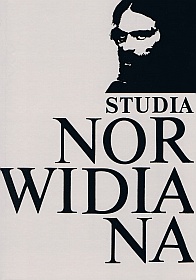Theocentric humanism or Christian personalism? (translated by Tadeusz Karłowicz)
Abstract
Renata Gadamska-Serafin’s book entitled Imago Dei. Człowiek w myśli i twórczości Cypriana Norwida [Imago Dei. The Man in Cyprian Kamil Norwid’s Thought and Works] is devoted to anthropological issues in the poet’s works. She focuses her studies on two anthropological issues: the essence of the man and the human condition; or in other words, the essence and the existence. These two issues are analyzed in the context of both the 19th century anthropological thought with all its base of theological and philosophical tradition, as well as of selected trends in modern anthropology. As a source context for Norwid’s reflections Biblical and patristic tradition, especially Paul’s theology, as well as Socratic philosophy and Thomism are referred to. The first chapters of the book are devoted to analysis and reconstruction of ontological aspects of Norwid’s anthropology. A lot of space is given to Norwid’s long and fervent polemic with Darwin’s evolutionism. The issue of Christian personalism in the poet’s works is especially meticulously presented. The second part of the deliberations on Norwid’s anthropology is devoted to the poet’s Christian existentialism recognized by the author. Quite a lot of space is taken up by three existential issues: suffering, sorrow and happiness. Another extensive part of the book, entitled Aetates hominum, is devoted to the periods in a human being’s life, from childhood to old age, in the poet’s works. And the final, short subsections deal with inter-human relations, such as love, friendship, politeness and dialogue. Looking for a formula that would describe Norwid’s whole thought about the man, in the conclusion the author reminds Hanna Malewska’s accurate definition: she called Norwid’s anthropology theocentric humanism.
References
Gadamska-Serafin R. Imago Dei. Człowiek w myśli i twórczości Cypriana Norwida. Sanok 2011.
Norwid C. Pisma wszystkie. T. 1-11. Zebrał, tekst ustalił, wstępem i uwagami krytycznymi opatrzył J.W. Gomulicki. Warszawa 1971-1976.
Tomasz z Akwinu. Dzieła wybrane. Tłum. i oprac. J. Salij OP. Poznań 1984.
Trybuś K. Stary poeta. Studia o Norwidzie. Poznań 2000.
Copyright (c) 2015 Studia Norwidiana

This work is licensed under a Creative Commons Attribution-NonCommercial-NoDerivatives 4.0 International License.





